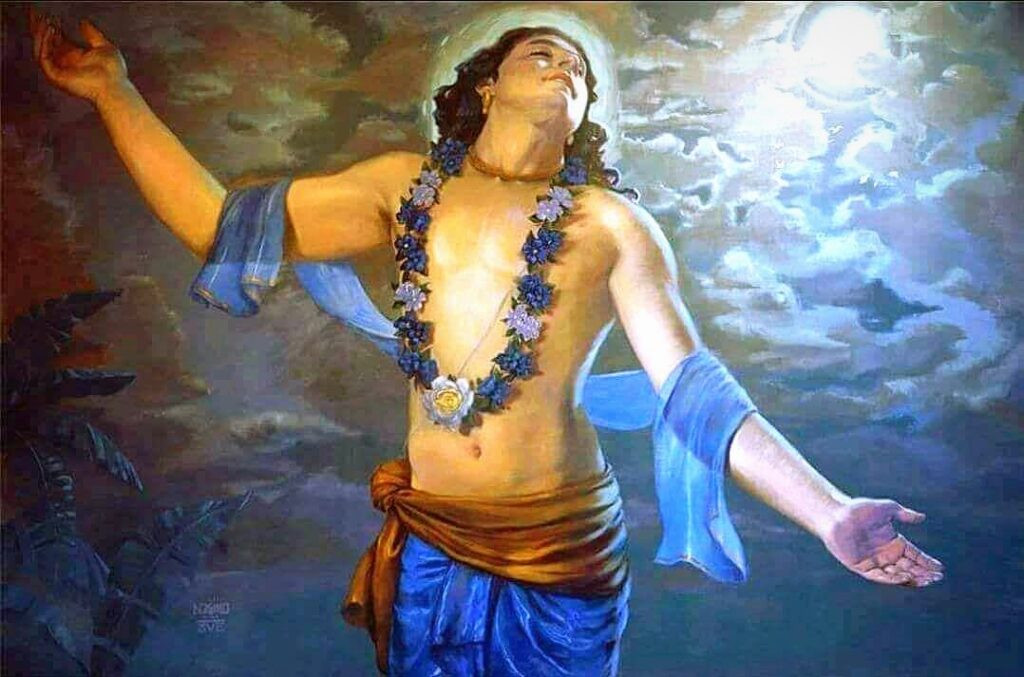
Life as we know it is a wonderful opportunity to recognize our true potentials and utilize them to help us and others perfect their existence. Being accustomed to the bondage of material existence, it is almost impossible for one to decipher the meaning of life on his own. Tired of suffering the pangs of material miseries, or being very inquisitive to reach the ultimate truth, a few fortunate souls might become the recipient of divine mercy. Life grows beautiful and the facts of life are interpreted very differently, once the seeds of devotion are rooted in one’s heart. The following article is an interpretation of the colorful panorama of life from the viewpoint of the philosophy of Gaudiya Vaishnavism.
#1 There are three fundamental entities that exist – God, living beings (jiva), and the dead. An entity that does not possess consciousness or the power of will can be classified as dead. Hence water, fire, earth, ether, wind, etc can be classified as dead matter. On the other hand, Man, animals, birds, etc can be classified as living entities as they are conscious and possess the ability of thinking and willing to a varying degree.
Bhumir apo ‘nala vayu kham mano buddhir eva ca
Ahankara itiyam me bhinna prakritir astadha
(Bhagavad Gita 7.4)
–
(Lord Krishna said) Earth, water, fire, ether, mind, intelligence and false ego – these constitute my eight separate material energies.
Apareyam itas tv anyam prakrtim viddhi me paramJiva bhutan maha baho yayedam dharyate jagat
(Bhagavad Gita 7.5)
–
(Lord Krishna continued) O mighty-armed Arjuna, besides these, there is another, superior energy of Mine, which comprises the living entities who are exploiting the reserves of this material world.
#2 Of all the conscious beings, Man is the most conscious, and his ability of thinking, willing, and feeling far surpasses the other living entities.
durlabha manava-janma labhiya samsare
Krishna na bhajinu-dukha kahibo kahare
(Song – Durlabha manava janma)
–
The human form of life is the rarest opportunity for attaining spiritual perfection. But now I am lamenting, because I’ve somehow or other been born with such an opportunity, but I have wasted it by never worshiping Lord Krishna, the Supreme Personality of Godhead. Oh, to whom shall I relate the tale of this misery?
#3 God is the creator of both the conscious and the dead. He is the Supreme conscious being and complete in all respects. He is the ultimate controller and the supreme cause of all causes. He dwells in the spiritual world, which is separate from this world of dead matter. It is by His divine will that this creation survives and remains functional.
etad-yonini bhutani sarvanity upadharaya
aham kritsnasya jagata prabhavah pralayas tatha
(Bhagavad Gita 7.6)
–
All created beings have their source in these two kinds of energies (spiritual and material). Of all that is material and all that is spiritual in this world, know for certain that I am both the origin and the dissolution.
#4 God is not formless. God possesses a form too but He is not trapped in a body of dead matter like us. As a result, He cannot be perceived by our gross material senses. That is why the revealed scriptures state that God is ‘Nirakara’ or without any form. The truth is that God does possess a form but that form is not material.

#5 All living entities, the conscious beings, are essentially spirit souls. We, the living entities of this world (humans, birds, animals, trees, etc) are spiritual beings trapped in bodies of dead matter. The Supreme Lord, however, possesses a spiritual body that is free from any traces or contaminations of matter. In other words, His form is entirely spiritual.
isvarah paramah Krishna
sac-cid-ananda-vigrahah
anadir adir govindah
sarva-karana-karanam
(Brahma Samhita)
–
Krishna who is also known as Govinda (controller of our senses) is the Supreme Personality of Godhead. He has an eternal blissful spiritual body. He is the origin of all. He has no origin. He is the prime cause of all causes.
#6 Hence the Supreme Lord cannot be observed with material senses, but only through eyes anointed with devotion.
premanjana-cchurita-bhakti-vilocanena
santah sadaiva hrdayesu vilokayanti
yam syamasundaram acintya-guna-svarupam
govindam adi-purusam tam aham bhajami(Brahma Samhita 5.38)
–
I worship Govinda, the primeval Lord, who is Shyamasundara Krsna Himself, possessing inconceivable innumerable qualities, and whom the pure devotees see in their heart of hearts with the eye of devotion tinged with the salve of love.
#7 Just like a blind person cannot observe the rays of the sun, similarly, a few unfortunate people of this world disprove the existence of God simply because they cannot perceive Him physically with their material eyes.
naham prakasah sarvasya yoga-maya-samavritah
muḍho ’yam nabhijanati loko mam ajam avyayam
(Bhagavad Gita 7.25)
–
(Lord Krishna said) I am never manifest to the foolish and unintelligent. For them I am covered by My internal energy (yoga-maya), and therefore they do not know that I am unborn and infallible.
Aprakrta vastu nahe prakrta gochara
Vede puranete ei kahe nirantara
(Chaitanya Charitamrita 9.194)
–
Spiritual substance is never within the scope and jurisdiction of the material interpretation. Vedas and the Puranas mention this repeatedly.
#8 The spiritual world (Vaikuntha) is situated far beyond the realm of matter. It is eternal, blissful, spiritual, and free from faults of material contamination. It cannot be observed with material eyes or perceived by our subtle minds. The spiritual world is inconceivable (Achintya) to us imperfect embodied beings. It is over here that the Supreme Lord resides along with His eternal associates.
na tad bhasayate suryo na sasanko na pavakah
yad gatva na nivartante tad dhama paramam mama
(Bhagavad Gita 15.6)
–
That supreme abode of Mine is not illumined by the sun or moon, nor by fire or electricity. Those who attain it never return to this material world.
#9 The whole purpose of our existence is to render loving devotional service unto the Supreme Lord, recognizing Him to be our ever well-wisher and our eternal object of love. One who knows this and awakens his/her eternal loving propensity for the Supreme Lord is awarded the opportunity to reside in the spiritual world and engage in loving service of the Supreme Lord. The spiritual world is free from miseries. It is eternal, full of knowledge, and bliss.
Naham vipro na ca nara patir
Napi vaisyo na sudro
Naham varni na ca griha patir
No vanastho yatir va
Kintu prodyan nikhila paramananda purnamritabdher
Gopi bhartuh pada kamalayor dasa dasanudasah
(Chaitanya Charaitamrita, Madhya, 13.80)
–
I am not a brahmana, nor a Kshatriya. I am not a vaisya nor a shudra. Nor am I a brahmachari, a householder, a vanaprastha, or a sannyasi. I identify Myself only as the servant of the servant of the servant of the lotus feet of Lord Krishna, the maintainer of the gopis. He is like an ocean of nectar and is the cause of universal transcendental bliss. He is always existing in brilliance.
(Lord Chaitanya to Lord Jagannatha)
#10 The material world that we live in is temporary and full of miseries. It is tormented by the problems of birth, disease, old age, and death that are all sources of trouble for the embodied soul. The soul is subjected to a lot of miseries in the mother’s womb where it is forced to lie in a constrained position and endure worm bites for ten long months. After taking birth, one has to tirelessly endeavor for food, shelter, and security, failing which one can be plunged into more difficulties. Natural disasters, diseases, and disputes with others cause added pain to the living entity. In short, there is nothing called unadulterated happiness in this material world. The short gap of time, when one is devoid of material miseries, is falsely claimed to be ‘happiness’ by the illusioned living entity.
mam upetya punar janma
duhkhalayam asasvatam
napnuvanti mahatmanah
samsiddhim paramam gatah
(Bhagavad Gita8.15)
–
After attaining Me, the great souls, who are yogis engaged in devotional service, never return to this temporary world, which is full of miseries, because they have achieved the highest perfection.
#11 Out of 8.4 million species of life, a human being is the most conscious and is perfectly equipped to attain complete spiritual realization. Hence one should not waste the precious human form of life and instead utilize it for God-realization from an early age. Death is unpredictable and can approach us at any moment.
vasamsi jirnani yatha vihaya navani grihnati naro parani
tatha sarirani vihaya jirnany anyani samyati navani dehi
(Bhagavad Gita 2.22)
–
As a person puts on new clothes, giving up old ones, the soul similarly accepts new material bodies, giving up the old and useless ones.
#12 The state of consciousness one quits his/her body during death decides the destination of the concerned soul. The actions performed during one’s lifetime have the greatest impact on one’s consciousness. Depending upon one’s state of consciousness at the time of death one can be sent to the abode of ghosts/spirits, sent to suffer in hell, united with one’s ancestors, sent to the heavens to enjoy celestial pleasures, or completely relieved of any material designations and sent back home to the spiritual world, where one can reunite with his/her eternal master.
yam yam vapi smaran bhavam
tyajaty ante kalevaram
tam tam evaiti kaunteya
sada tad-bhava-bhavitah
(Bhagavad Gita 8.6)
–
Whatever state of being one remembers at the time of quitting his/her body, that state he will attain without fail (in his next life)
#13 Unless one is freed from material designations, one continues to suffer in this material world, transmigrating from one body to the next. All embodied living entities starting from demigods enjoying in heaven to small ants of this world are subject to birth, disease, old age, and death.

#14 Fear, hope, sense of duty, and natural attraction (love) towards the Supreme Lord are the most noticeable factors initially driving one to serve God. As one practices devotion, the abovementioned factors of fear, hope, and duty gradually fade away and make way for the spontaneous pure love for God. Devotional life is a reservoir of unadulterated bliss and one who tastes it can no longer be content with any material pleasures or circumstances.
Premera svabhave kare citta tanu kshobha
Krishnera charana praptye upajaye lobha
(Chaitanya Charitamrita 7.87)
–
Love of God (Prema) by its very nature induces transcendental symptoms in one’s body and makes one more and more greedy to attain the shelter of the Lord’s lotus feet.
#15 Spontaneous love or ‘Raga’ is the ideal way of rendering devotional service unto God. Awakening of this spontaneous relationship is the success of one’s life. This relationship between the Supreme Lord and the living entity is an eternal truth, forgetting which the living entity subjects himself/herself to countless material miseries.
Krishnera charane haya yadi anuraga
Krishna vinu anyatra tara nahi rahe raga
(Chaitanya Charitamrita, Adi,7.143)
–
If one develops his love of Godhead and grows attached to the lotus feet of Krishna, the Supreme Lord, then he gradually loses his affection for everything else.
#16 Devotion unto God driven by fear, hope, or duty cannot be considered pure. Devotees practicing them are inferior to those who render devotional service unto God driven by spontaneous love (Raga). However, as discussed before, hope, fear, and duty make way for spontaneous love, as one gradually evolves in his/her devotional life.
Tantra seva vina jivera na yaya samsara
Tanhara charana priti – purusartha sara
Moksadi ananda yara nahe eka kana
Purnananda prapti tanra charana sevana
(Chaitanya Charitamrita, Madhya, 18.194-195)
–
No conditioned soul can get out of material bondage without serving the Supreme Personality of Godhead. Loving His lotus feet is the ultimate goal of life. The joy of liberation, whereby one merges into the Lord’s existence cannot even be compared to a fragment of the transcendental bliss obtained by serving the Supreme Lord’s lotus feet.
#17 If we examine the life and history of people living in various parts of the world, we shall come to realize that faith in God is universal and a natural characteristic of people in general. Even the uncivilized tribes living in the forest, worship trees, rivers, mountains, etc, and exhibit their reverence towards the divine.
Jivera svarupa haya – Krishnera nitya dasa
Krishnera tathastha sakti bhedabheda prakash
(Chaitanya Charitamrita, Madhya, 20.108)
–
It is the living entity’s constitutional position to be an eternal servant of Krishna. He is the marginal energy (tathastha sakti) of Krishna and a manifestation of being simultaneously one with and different from the Supreme Lord.
#18 No two personalities are the same. Hence culture, actions, customs, manners, characteristics, lifestyles of people vary in different parts of the world. Hence although faith and worship of God is a universal practice, it is followed differently by different people.
#19 As long as the principal goal is to serve and render devotion unto the Supreme Lord, the secondary differences between people and their ways of worship do not matter. Hence one should be very careful in not criticizing other devotees who may possess a different style of worshiping the same Supreme Lord.
Yei bhaje sei bada, abhakta hina chhara
Krishna bhajane nahi jati-kuladi-vichara
(Chaitanya Charitamrita, Aunty, 4.67)
–
Anyone who takes to devotional service is exalted, whereas a non-devotee is always condemned and fallen. Therefore in the discharge of devotional service towards the Supreme Lord, there is no consideration of caste, class, or one’s family lineage.
#20 Different people might be loyal followers of different religious teachers. Their ways of worshiping God might be different or they might call upon God with a different name. One should understand however that the ultimate goal of all religious practices is attaining love of God. Hence, one should strictly avoid criticizing other religious practices or harboring any rivalry against each other. One should always consider other religious practices as different ways of worshipping the same Supreme Lord.
#21 If one harbors hate, resentment, or enviousness towards other religious groups, it must be assumed that such a person does not value his supreme interest or love the Supreme Lord more than he is inclined in confronting others.
#22 As stated earlier, the petty differences between various religious groups are insignificant, as long attaining the love of God is the principal goal. At the same time, it should be recorded that a particular religious practice must be free from faults like atheism, speculation, materialism, voidism, etc. In other words, a philosophy or a religious practice that serves in pushing a soul away from its natural tendency to love the Supreme Lord must be rejected. Such philosophies or religious practices do not help the soul unite with the Supersoul and are hence not above criticism.
Bhakti siddhanta viruddha ,ara rasabhasa
Sunite na haya prabhura chittera ullasa
(Chaitanya Charitamrita, Madhya, 10.113)
–
Sri Chaitanya Mahaprabhu was never pleased to listen to books or verses that are opposed to conclusive statements of devotional service. The Lord did not like hearing rasabhasa, the overlapping of transcendental mellows.
#23 In order to bloom, Love requires a lover and an object of love. Without them, love holds no identity. Likewise, the living entity is the lover and God is the ultimate object of his eternal love.
#24 Once this love blossoms and turns spontaneous, the Supreme Lord is completely revealed unto the living entity. As this divine love grows, the impersonal conception of God is replaced with a personal one. The living entity realizes that God is a person possessing a set of qualities and fully capable of reciprocating personally.

#25 As this divine love evolves further, awe and reverence for the all-powerful and all-opulent Supreme Lord give way to an intense attraction and attachment for His sweetness, magnanimity, and His unlimited other qualities. Such a devotee now no longer fears the Lord or worships Him for any material benedictions. Instead, he worships the Lord for he cannot help but associate with his object of eternal love.
Maryada haite koti sukha sneha acharane
Paramananda haya yara nama-sravane
(Chaitanya Charitamrita, Madhya, 10.140)
–
Dealing affectionately with the Supreme Personality of Godhead is many millions of times more ecstatic than dealing with Him in awe and veneration. Simply by hearing the holy name of the Lord, the devotee is merged in transcendental bliss.
#26 Such a devotee can control his mind, transcend material nature, and even his material desires. Such a perfect devotee rejoices in boundless spiritual bliss and is not shaken even amidst the greatest of difficulties. This certainly is actual independence – freedom from all miseries arising out of material contact. Such a person identifies everything as part and parcel of the Supreme and tries to engage them in the service of the Supreme Lord.
Taiche bhakti phale Krishne prema upajaye
Preme Krishna-svada haile bhavna nasha paya
Daridrya nasha, bhava kshaya – premera ‘phala’ naya
Prema sukha bhoga – mukhya prayojana haya
(Chaitanya Charitamrita, Madhya, 20.141-142)
–
As a result of devotional service unto Lord Krishna, one’s dormant love for Krishna awakens. When one is so situated that he can taste the association of Lord Krishna, his material existence, the repetition of birth and death reaches an end. The goal of love of Godhead is not to grow materially rich or free from material bondage. the real goal is to be situated in devotional service to the Lord and to enjoy transcendental bliss.
#27 The ancient Vedic scriptures proclaim that chanting the holy Name of the Supreme Lord is the only practical and effective means of cultivating spiritual realization (devotion) in this present day and age (Harer nama harer nama harer namaiva kevalam kalau nasthyeva nasthyeva nasthyeva gathir anyatha – Brhan Naradiya Purana). Nothing else is as powerful. Love of the Supreme Lord is not something that can be achieved artificially from an external source. It is eternally existing within the hearts of all living entities. When the heart is purified by the process of regular hearing and chanting the holy names, glories of the Supreme Lord, this eternal love awakens and reveals itself once more.
nitya-siddha Krishna-prema ‘sadhya’ kabhu naya,
sravanadi suddha chitte karaye udaya
(Chaitanya Charitamrta, Madhya, 22.107)
–
Pure love for Krishna is eternally established in the hearts of the living entities. It is not something to be gained from an external source. When one’s heart is purified by the regular hearing and chanting of Krishna’s holy name and glories, this love naturally awakens.